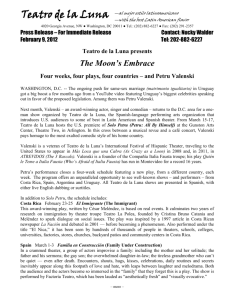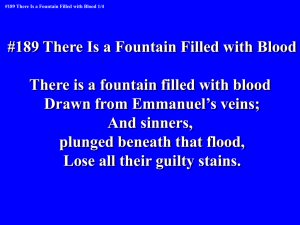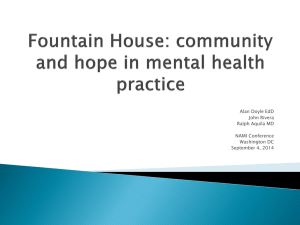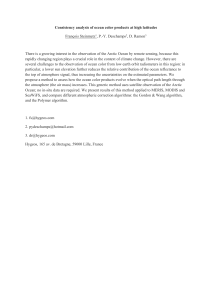Study Guide - Teatro de la Luna
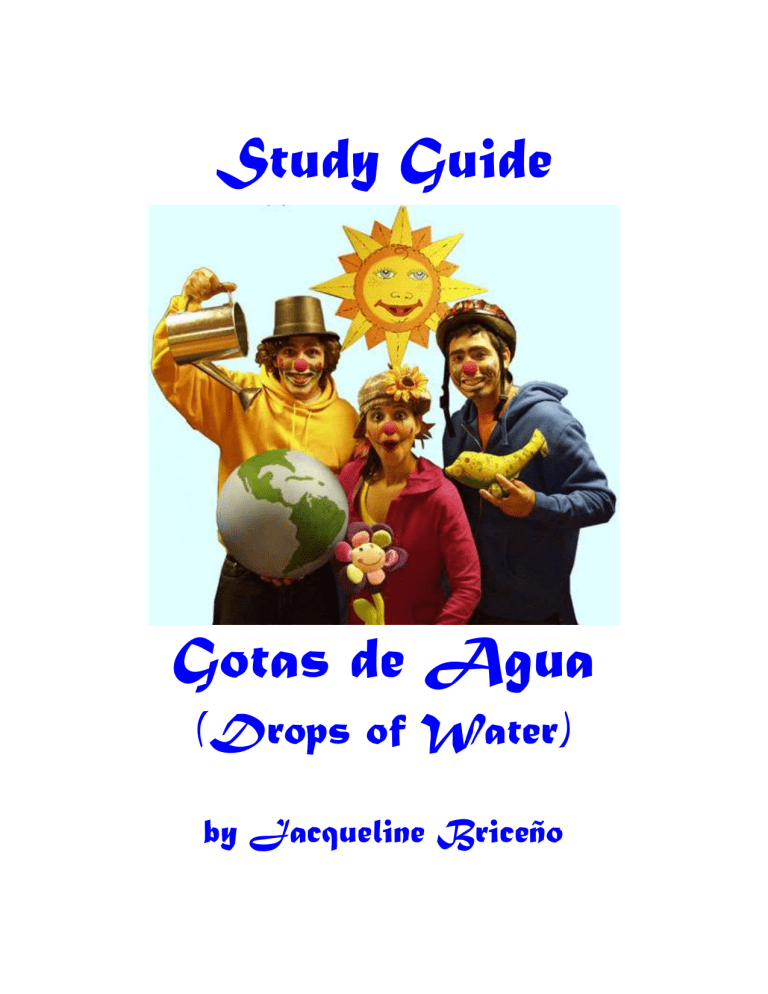
Study Guide
Gotas de Agua
(Drops of Water) by Jacqueline Briceño
Teatro de la Luna
Gotas de Agua Study Guide
Table of Contents
Synopsis of Story ……………………………………………………………….. 3
Spanish Vocabularies, Translations and Pronunciation Guide …………………. 4
Spanish Phrases with English Translations …………………………………….. 6
English Vocabularies with Definitions …………………………………………. 7
Theater Vocabulary in Spanish and English ..………………………………….. 9
The Nature of Water …………………………………………………………... 10
Water Pollution ………………………………………………………………... 11
Biography of Playwright Jacqueline Briceño …………………………………. 13
Performance Related Classroom Activities
1) Pre K though 1st Grade
2) 2nd Grade through 4th Grade
3) 5th Grade through 7th Grade
Bibliography
Page 2
Teatro de la Luna
Gotas de Agua Study Guide
Summary of the Play
Gotas is a happy town with a special fountain that gives the town clean, clear water. Rocio is the fountain’s guardian, who makes sure no one pollutes its water.
She is especially worried because other towns nearby have been hurt by a bad virus, Humanus Descorazonadus, that steals the hearts of humans.
One day, Rocio hears her name being called. She hides the fountain and goes to answer the call.
But the call came from Conta, the King of Contamination. He wants to put his virus, Humanus Descorazonadus, in Gotas’s fountain. When Rocio returns, Conta freezes her and forces her to tell him where the fountain is.
Just as he is about to destroy Gotas’s pure water, Hidroamigo arrives to help save the day. He frees Rocio, and together they battle Conta. The magic fountain is saved!
Page 3
Teatro de la Luna
Gotas de Agua Study Guide
Spanish Vocabulary with English Translation by Grade Level
Pre-K through 1st Grade abuelita (ah-boo-ai-LEE-tah) ……….……. granny agua (AH-gwa) ……………………………. water ave (AH-vay) ………………………………... bird ayudar (ah-you-DAR) ……………………. to help calle (CA-yeah) …………………………… street camino (cah-ME-no) ……………………….. road circo (SEER-coh) …………………………. circus ciudad (see-oo-DAHD) …………………….... city color (coh-LORE) ………………………….. color corazón (core-ah-ZTHOWN) ………………. heart crecer (cray-SAIR) …………………….… to grow cuidado (cooee-DAH-dough) …………. watch out dar (dahr) …………………………………. to give dolor (dough-LORE) …………………… pain/hurt dulce (DOOL-say) ………………………… sweet dura (DO-rah) …………………………..…… hard enferma (ain-fair-mah) ………………………. sick fácil (FAH-sill) ……………………………… easy feliz (fay-LEEZTH) …………………….…. happy fuego (foo-AI-go) ……………………………. fire fuente (foo-AIN-tay) ……………………. fountain gotas (GO-tahs) ……………………………. drops historia (ee-STORE-ee-ah) ……………….… story jugar (who-GAR) ……………………...…. to play limpio (LEAM-pea-oh) …………………….. clean lindo (LEAN-dough) ………………………. pretty lluvia (YOU-vee-ah) ………………………… rain
2nd through 4th Grade alérgico (ah-LAIR-hee-coe) …………...… allergic alguien (AHL-gee-n) ………………….... someone bañarse (bah-NIAR-say) ……….. to wash oneself basura (bah-SOOR-ah) …………………..…. trash belleza (bay-YEAH-ztha) ………………… beauty botella (bo-TAY-ya) …………………….… bottle burbuja (boor-BOO-ha) ………………...… bubble cambiar (cahm-be-ARE) ……………..... to change campeón (cahm-pay-OWN) …………….….. hero campo (CAHM-poe) ………………………... field cantidad (can-tee-DAHD) ……………….. amount cero (SAY-row) ………………..……………. zero contento (con-TAIN-toe) ………………… pleased corazón (core-ah-ZTHON) ………………… heart cortar (core-TAR) …………………….……. to cut mágico (MAH-hee-co) ……………………. magic manos (MAH-nose) ………………………... hands mejor (may-HORE) …………………..……. better nada (NAH-dah) ………………………..... nothing niños (NEE-niose) …………………….… children niña (NEE-nia) ………………………..……… girl nombre (NOME-bray) …………………..…. name nuestro (new-AI-strow) …………………….… our nunca (NOON-ka) ………………………..... never peces (PAY-says) …………….. fish (more than 1) pequeña (pay-KAY-nia) …………………….. little playa (PLA-ya) ………………………..…… beach real (ray-AHL) ……………………………….. real regalo (ray-GAH-low) …………………..…… gift rey (RAY) ………………………………..….. king salir (sah-LEAR) ……………………….... to leave señor (say-NIOR) ……………………… sir/mister señorita (say-nior-EE-tah) …………………... miss siempre (see-M-pray) …………………….. always sol (SOHL) …………………………………… sun tarde (TAR-day) ……………………………... late tiempo (tee-M-poe) …………………….…… time ver (vair) …………………………………… to see vida (VEE-dah) ………………………………. life viento (vee-AIN-toe) ……………………..... wind voz (VOZTH) ……………………………… voice corriendo (core-ee-N-dough) ………...….. running creer (cray-AIR) ……………………….. to believe cubierta (coo-bee-AIR-tah) ……………… covered curar (coo-RAR) …………………………. to cure delicioso (day-lee-CIO-sow) …………... delicious despertar (day-spare-TAR) …………... to wake up doler (doe-LARE) ………………………… to hurt engañar (ain-ga-NYAR) ……………. to fool/cheat encontrar (ain-con-TRAHR) ……………… to find escuchar (ais-coo-CHAR) ……………. to listen to esperar (ais-pair-ARE) ……………… to wait/hope estómago (ais-TOE-mah-go) ………….… stomach famosa (fah-MOSE-ah) ………………….. famous fresco (FRAYS-coh) ……………….……….. fresh fuerte (foo-AIR-tay) ………………………. strong
Page 4
Teatro de la Luna
Gotas de Agua Study Guide gente (HAIN-tay) …………………..……... people gusto (GOOSE-toe) ……………….…. taste/liking hablar (ah-BLAR) ……………………….... to talk hermoso (air-MOE-sow) ……. beautiful/handsome huele (oo-AI-lay) …………………….…. it smells igual (ee-GWHALL) ……………….……… equal joven (HO-vain) ………………………...… young lagos (LA-goes) ………………………..…… lakes libre (LEE-bray) ……………………………... free lugar (loo-GAR) ……………………………. place llegar (yeah-GAHR) ……………………. to arrive llorar (yo-RAR) ……………………….…… to cry malvado (mal-VAH-dough) ……………… wicked mar (MAHR) ……………………………...….. sea memoria (may-MORE-ee-ah) ………..…. memory mirar (mee-RAR) ……………………… to look at montaña (moan-TAHN-ya) ………….… mountain mover (mow-VAIR) ………………….…. to move mundo (MOON-dough) ………………...…. world necesitar (nay-say-see-TAR) …….… to need/want nubes (NEW-base) ………………...……… clouds oír (oh-EAR) …………………….……….. to hear olvidar (ol-vee-DAR) …………………... to forget ordenar (or-day-NAR) …………………... to order país (pah-EES) …………………………... country
5th through 8th Grade adivinar (ah-dee-vee-NAR) ……………... to guess admirada (ahd-me-RAH-da) ……………. admired adminístrala (ahd-mean-EES-tra-la) …... manage it alimentarse (ah-lee-men-TAR-say) to feed oneself amoroso (ah-more-OH-soe) …………….… loving anciana (ahn-see-ANA) …………….... old woman aplausos (ah-PLOW-sews) ……...……… applause apoderar (ah-poe-dare-ARE) ……….. to authorize armonía (are-moe-KNEE-ah) ….……….. harmony arreglar (ah-ray-GLAR) …………………..... to fix arrojar (are-oh-HAR) …………………… to throw arruinar (ahr-roo-ee-NAR) ……………...… to ruin asco (AHS-co) ………………..…. disgust/loathing asombroso (ah-soam-BRO-so) …………. amazing asunto (ah-SOON-toe) ………………… the matter aterrar (ah-tay-RAR) …………………….. to panic cenizas (say-KNEE-zthas) ……………….… ashes cepillarse (say-pea-YAR-say) ….. to brush oneself colocar (co-low-CAR) ………………… to arrange compuerta (comb-pooAIR-tah) ……….. flood-gate conjunctivitis (con-hoonk-tee-vee-tees) … pinkeye conocer (coh-no-SAIR) ………………… to know consérvarla (con-SAIR-var-la) ………. conserve it parar (par-ARE) …………………………... to stop peligro (pay-LEE-grow) ………………….. danger pensar (pain-SAR) ……..………………… to think peor (pay-OR) ……...……………………… worse perfecto (pair-FAKE-toe) ……………….... perfect planeta (pla-NAY-tah) …………………….. planet poder (poe-DARE) …………………..……. power polvo (POLE-voe) …………………………... dust prometer (pro-may-TAIR) ……………. to promise riega (ree-AI-gah) ………………... waters (plants) rio (REE-oh) …………………………..……. river rocío (row-SEE-oh) …………………………. dew seca (SAY-ca) ………………………………... dry sonoro (so-NO-row) ………………………… loud sordo (SORE-dough) ……………………….. deaf tesoro (tay-SORE-oh) ………………….... treasure tomar (toe-MAR) …………to take/ (drink) to have traer (tray-AIR) ………………..………… to bring
único (OO-nee-coh) ………………….……… only uñas (OO-nias) …………………... finger/toe nails vecino (vay-SEE-no) …………………… neighbor visitante (vee-see-THAN-tay) …………….. visitor volver (vole-VAIR) …………………….. to return vuelo (VOOAI-low) ……………………..…. flight contaminación (con-tah-me-nah-see-OWN) … contamination convertir (con-vair-TIER) ………….… to convert cristalina (cree-stahl-LEE-no) ……….. like crystal chiquilla (chee-KEY-ya) ………... youngster (girl) decorar (day-core-RAR) ……………... to decorate definitivamente (day-feen-ee-tee-va-main-tay)… definitely desperdicios (days-pair-DEE-see-ohs) ...… rubbish destruido (days-true-EE-dough) ………. destroyed detener (day-tay-NARE) …………….... to hold up diariamente (dee-are-ee-ah-MAIN-tay) ……. daily ejecutar (ai-hay-coo-TAR) ………. to execute (do) encantar (ain-cahn-TAR) ………...……. to delight enfrentar (ain-frain-TAR) ………..….. to confront enseguida (ain-say-GHEE-dah) ……. immediately ensuciar (ain-sue-see-ARE) ……….. to soil/befoul enviarnos (n-vee-ARE-nose) ………….. to send us escalofrío (ais-cal-oh-FREE-oh) ………….... chills estupendo (ais-too-PAIN-dough) ………… terrific evaporarse (ai-vah-poor-ARE-say) …. to evaporate existir (aiks-sees-TIER) ………………..… to exist explicación (aiks-plea-ca-seOWN) ..… explanation
Page 5
Teatro de la Luna
Gotas de Agua Study Guide extraño (aiks-TRAN-yio) ………………… strange fantasía (fahn-tah-SEE-ah) ………………. fantasy reflexionar (ray-flay-see-o-NAR) ……… to reflect regresar (ray-gray-SAHR) …………….... to return fastidiar (fas-tee-dee-ARE) …………….. to annoy fíjate (FEE-ha-tay) …………………………... look fulminante (fool-me-NAHN-tay)…… explosive/unstable gracioso (grah-see-OH-soe) …… gracious/graceful guardián (who-are-dee-AHN) ………….. guardian habitante (ah-bee-TAHN-tay) ………… inhabitant imaginario (ee-mah-he-NAR-ee-oh) ….. imaginary revivir (ray-vee-VERE) ………………..... to relive resistar (ray-sees-TAR) ………………….... t resist rhinitis (rean-EE-tees) ……………….. congestion sagrado (sah-GRAH-dough) …………….... sacred salada (sah-LAH-dah) ……………………... salted salvar (sal-VAR) ………………………. to rescue seguir (say-GEAR) …………………….... to go on seña (SAY-nia) ……………………...… sign/mark sequía (say-KEY-ah) …………………….. drought joven (HO-vain) ………………….… young/youth juguetón (who-gay-TONE) ………………. playful lata (LAH-tah) ……………………………... a can levantar (lay-vahn-TAR) ………………… to raise líquido (LEE-key-dough) ………………….. liquid maravillosa (mar-ah-vee-YO-sah) ….… marvelous mentiroso (main-tier-OH-soe) ……………...… liar mintiendo (mean-tee-AIN-dough) …………. lying muelas (moo-AI-las) ……………… molars (teeth) obsequios (ohb-SAY-key-ohs) ………...……. gifts ocurrir (oh-coo-REAR) ………………... to happen paralizador (par-ah-lee-ztha-DOOR) …... paralyzer pelear (pay-lay-ARE) ………………….… to fight perfectamente (pair-fake-tah-MAIN-tay) . perfectly poquitín (poe-key-TEEN) …………….…. little bit preciado (pray-see-AH-dough) ………..... precious preocupar (pray-oh-coo-PAR) ………..… to worry protección (pro-take-see-OWN) ………. protection seres humanos (SAY-race oo-MAN-ose) … human beings silvato (seal-VAH-toe) ………………...…. whistle simpático (seem-PAH-tee-co) .. pleasant/agreeable sonar (soe-NAR) ………………… to play (music) sorprender (sore-prain-DARE) …….…. to surprise sospechoso (soes-pay-CHO-so) …….… suspicious suficiente (sue-fee-see-AIN-tay) ………. sufficient superficie (sue-pair-FEE-see-ai) ……….… surface tampoco (tahm-POE-co) …………...… neither/not temas (TAY-mahs) …………………….…. themes temperature (tame-per-ah-TOU-ah) … temperature transformar (trahns-for-MAR) ……... to transform transparente (trans-par-AIN-tay) …….. transparent tristeza (trees-TAY-ztha) ………………... sadness urgencia (oor-HANE-see-ah) ……….…... urgency protector (pro-taic-TORE) ……….…… protective protégela (pro-TAY-hay-la) ……...…….. protect it valiente (va-lee-AIN-tay) ………………… valient valioso (vah-ee-OH-soe) ……………..…. valuable verdadero (vair-dah-DARE-oh) …..… truthful/real virus (VEE-ruse) ……………………………. virus purificar (poor-ee-fee-CAHR) ………...... to purify quizás (key-ZTHAHS) ……………………. maybe realmente (ray-ahl-MAIN-tay) …………….. really reciclar (ray-see-CLAR) ……………..... to recycle vital (vee-TAHL ) ……………...…………… vital
Spanish Phrases with English Translation
¿Cómo se llama? ………………………... What is his/her name?
¿Que pasaría? …………………………… What would happen?
¿Que sería? ……………………………… What could it be?
Page 6
Teatro de la Luna
Gotas de Agua Study Guide
English Vocabulary with Definitions by Grade Level
Pre-K through 1st Grade animal awful beautiful brush city covered cry daily dirty drops friend hear heart help lake listen morning nothing ocean plan plant rain steal story teeth thirsty water without a living thing that is not a plant, can move around, and feed itself. (The zoo is full of many animals.) very bad or terrible. (Throwing trash on the ground is awful.) very pretty to see, hear or feel. (Rain helps beautiful flowers grow.) a tool for cleaning, painting or other things. It has a handle on one end and a bunch of stiff on the other. (How often do you brush your teeth?) a place with lots of buildings where many people live and work. (Washington, D.C. is a big city.) to put something over or on something else. (Rocio covered the fountain to hide it.) tears falling from the eyes. (Babies cry when they are hungry.) every day. (I water the plants daily.) not clean. (I fell in the mud and got dirty.) tiny bits of liquid with a round shape. (Drops of rain fell from the sky.) someone whom you know and like very well. (My best friend is my dog.) to get sound with your ears. (Rocio could not hear the whistle.) the part of the body that is in charge of blood flow; also a symbol of loving or being kind.
(Conta’s virus takes away people’s hearts.) to do part of the work for someone. (Can you help me lift this?) a large or medium body of fresh or salt water that has land all around it. (I like to fish in the lake.) to pay attention to what can be heard. (Listen to the birds singing.) the early part of the day, before noon. (In the morning I eat breakfast.) not anything.
(There’s nothing to eat!) a large body of salt water that covers a lot of the earth. (The ocean is fun to swim in.) something you intend to do. (My plan is to finish my homework and then play.) a living thing that has leaves and roots. (Plants need water to live.) drops of water that form in the clouds and fall to earth.
(Rain is one of the earth’s treasures.) to take something from someone else without being allowed. (Conta wants to steal people’s hearts.) a report of something that happened or is made up.
(“Gotas de Agua” is a story about a magic fountain.) hard, white objects in a row in the mouth. (My teeth feel cold when I eat ice cream.) a need to drink water. (Running makes me thirsty.) the clear stuff that is in rain.
(Water is good to drink when you’re hot.) not with; having none or no. (Without water, grass would die.) whistle a small instrument that makes a noise when you blow air through it. (I call my dog with a special whistle.)
2nd through 4th Grade allergic blow boring a reaction your body has to some things that make it feel sick or cause a rash. (Many children are allergic to peanuts.) to force air out of the mouth. (I like to blow my horn.) something or someone who is very dull. (Sometimes my family can be boring.)
Page 7
Teatro de la Luna
Gotas de Agua Study Guide deaf destroyed not able to hear. (Conta made Rocio deaf with his dust.) to ruin completely. (The fire destroyed the house.) dew difficult doubt dust cleanliness famous fountain little drops of water that collect at night on grass and other surfaces. (In the morning looks like diamonds.) hard to do or understand. to not know for sure.
(It was difficult to stop Conta from ruining the fountain.)
(I doubt that Conta likes children.) recognized or liked by people. magic fountain had very pure water.) human beings people. (Conta doesn’t like human beings.) tiny, dry pieces of soil, dirt or other things. (There is a lot of dust on the table.) the habit of always keeping clean. (Conta doesn’t like Rocio’s cleanliness.)
(Gotas was famous for its fountain.) a spray of water made by a machine, or the thing from which the water flows. (Gotas’ leave order to go away from. (Rocio could not leave the fountain.) to tell someone to do something in a strong way. (Rocio ordered Conta to put her down.) percent (%) one part, or a fraction, of something. (Rain is 100 percent wet.) planet protect minute mistreat ready river shower a large object in outer space that circles around the sun. to defend or keep safe. a unit used to measure time. One minute is 60 seconds. to treat badly. (Never mistreat an animal.) fit and prepared to do something. a large stream of water that flows in one direction.
(Our planet is the Earth.)
(I always protect my little brother.)
(Ready or not, here I come!)
(The Potomac River is near
(I shall be ready in a minute.)
Washington, DC.) washing your body with an overhead tool that sprays water over you. (I like to shower silence spread strange suddenly surface teach trash treasure virus wonderful before school.) without a sound; quiet. (There is silence in the theater before the play.) to open or stretch out. (The virus spreads from city to city.) unusual or odd. (Conta is a very strange person.) something happening without warning. (Suddenly, Rocio heard her name called.) the outside of something. (The surface of the moon is rocky.) to show how to do something, or to help someone learn. (This play teaches about water.) things that are thrown away because they are not wanted. (Conta threw trash all over the street.) money or something valuable that has been stored up. (The magic fountain was a special treasure to Gotas.) a tiny living thing that lives in other living things and causes diseases. (Conta wants to hurt the whole world with an awful virus.) causing a feeling of happiness or wonder. (Gotas is a wonderful city.)
5th through 8th Grade admire to respect; to hold in high esteem.
(I admire Rocio’s dedication.) brotherhood a warm and close feeling between people who feel like family, or are family. (The people of Gotas live in close brotherhood.) contamination something that is unclear or impure. (The lake is contaminated with trash.) crystal a clear colored rock with a regular shape; to be clear, not clouded. fountain in Gotas was crystal clean.)
(The water in the defender definitely someone who guards or protects a person, place or thing. (Hidroamigo was the defender of the magic fountain.) without a doubt. (Gotas is definitely a wonderful city.)
Page 8
Teatro de la Luna
Gotas de Agua Study Guide glacier marvelous nourish precious pure large mass of ice formed in cold regions from compacted snow, slowly moving down a slope or across land. (The glacier moves at about 5 feet per day.) causing awe, admiration or amazement.
(It’s marvelous that you’ve learned all these words.) to supply with food needed for life and growth. (The dew nourishes the grass and trees.) of great value. (Water is as precious as air.) not mixed with anything else; clean, not dirty. (The water in the stream is so pure it’s reign sea like crystal.) to have complete control or influence; comes from a monarch ruling. (Peace and happiness reign in Gotas.) a large body of salt water completely or partially surrounded by land; some people also use sea as interchangeable with ocean. (The Mediterranean Sea is almost surrounded by unattended land.) to not be present at a specific place. (Rocio didn’t want to leave her fountain unattended.) unfortunately suffering from bad luck; unlucky. (Unfortunately, the dog ate my homework again.)
Vocabulario de Teatro (Theater Vocabulary)
Autor (auw-TORE)
Escena/Escenario/
Escenografía
(ai-SAIN-ah,
Playwright: The person who wrote the play.
Actor/Actriz Actor/Actress: The men and women who play the parts onstage.
(ahk-TORE/ahk-TREESTH )
Director (dee-reck-TORE) Director: The person who picks the actors and tells them what to do.
Scene/Stage/Scenery: All words related to the stage. The scene is the location where each part of a play takes place; the stage is the place where the actors work, and the scenery is what they act in front of.
ai-sain-ARE-ee-oh,
ai-sain-oh-grah-FEE-ah)
Fotografía
Photography. Photos have to be taken of all shows – for publicity, for
(foe-tow-grah-FEE-ah) program covers, and for reminders.
Maquillaje (mah-key-YA-hay) Makeup: All actors, both women and men, wear stage makeup to make them more visible from the audience.
Musicalización
Music Design: Selecting what music is used for the play.
(moo-see-cah-lee-tha-see-OWN)
Producción
Production: The people who organize everything about the play,
(pro-duke-see-OWN) including who will direct it, who will design and build the set, and where the costumes come from.
Sonido (sow-NEE-doe) Sound: Not just music is used during a play; many times there are other sounds involved, too.
Vestuario (ves-too-ARE-ee-oh) Costumes: What the actors wear to make them look different.
Utilería
(oo-teel-air-EE-ah) Properties: everything that an actor uses onstage (such as the Old
Woman’s embroidery).
Page 9
Teatro de la Luna
Gotas de Agua Study Guide
The Nature of Water
We see water everyday. It comes out of the tap when we brush our teeth or wash dishes. It falls from the sky as rain, and if it’s cold, as snow. Sometimes we see hail, which is also water. We built snowmen out of it, swim in it, and sail on it. Water is a part of our lives.
But water is also necessary for life. Without water, we can not live. An average adult man can live between 48-60 days with no food, but for only
3-6 days with no water.
So what is water? The scientific answer is that each molecule of water is made up of one oxygen atom and two hydrogen atoms. However, it’s really more complicated than that. Water sticks together because in each molecule of water, the hydrogen atoms want to be near the oxygen atom of a neighboring molecule of water. We can say that water is sticky, even though we don’t feel its stickiness.
Water, as you know, can go from a solid to a liquid and back again.
But it can also become a gas. The water cycle is when liquid water (a lake, ocean, or even a puddle) changes from liquid to a gas (steam or fog), and rises into the air where it forms clouds. After awhile, the gas in the clouds becomes liquid again, and falls to the ground as rain, snow or hail.
The solid forms of water include snow, ice and hail. Glaciers are huge areas of packed snow and ice. Ice can be as small as the cubes you put in a drink and as big and thick as the Arctic Ocean in winter.
When water freezes, turning from liquid to solid, it gets bigger, or expands. You may have seen this happen if you’ve left a full soda bottle in the freezer by accident. When you finally remember it, the top has exploded off of the bottle and the partially frozen soda is all over the inside of the freezer.
Most of the water we’ve talked about so far is fresh water; water we can drink. But most of the water on earth – 97 % - is salt water, found in oceans, seas and salt lakes. Almost all streams and rivers flow into an ocean eventually.
Page 10
Teatro de la Luna
Gotas de Agua Study Guide
Pollution in the Ocean
The oceans of the world are becoming dirtier and dirtier. For years people thought that it did no harm to dump plastics, left-over rope, waste-water from ships, and even some oil into the ocean.
They thought the ocean could clean itself easily. However, we know now that the ocean can only clean itself to a point.
Man-Made Products :
About 10% of the 100 million tons of plastics which are made each year end up in the ocean. 20% of this is thrown from ships, boats and platforms (like oil platforms); the rest comes from plastics left on land or in rivers and washed into the ocean. Most plastics do not disintegrate easily, so they’re with us for a long time. A single large soda bottle could break up into enough tiny pieces to be able to put one piece on every single mile of beach in the whole world.
Plastics can hurt and kill animals in the ocean. They eat the plastic thinking it is food.
Glass is also thrown away, but does not have as bad an impact on animal life as plastic does, mainly because it is heavier and sinks. However, broken glass has its own dangers.
Oil:
Most oil pollution does not come from big spills. It comes from people changing their car oil, regular cleaning of the inside bottoms of ships (bilges) and other ship activities, and air pollution from cars and factories that settles into the ocean through rain.
If one person changes his car oil and lets the old oil wash into the gutter instead of collecting and carefully getting rid of it, that oil can pollute a million gallons of water.
Scientists estimate that about 363 million gallons of oil ends up in the ocean every year this way.
When sailors empty the bilges of ships, or clean the decks of ships, they wash about 137 million gallons of oil into the ocean by accident each year.
Air pollution causes about 92 million gallons of oil pollution each year when cars and factories pollute the air.
The polluted air is condensed into clouds which rain into the ocean.
Page 11
Teatro de la Luna
Gotas de Agua Study Guide
Only 5 percent of oil pollution is caused by big oil tanker accidents, though it still is about 37 million gallons of oil leaked into the ocean each year. Offshore drilling accounts for 15 million gallons of oil.
Some oil pollution is even natural, because there are places in the ocean where oil seeps through decaying rock into the water. This causes about 62 million gallons of pollution every year.
Animals and birds can be harmed for many years by oil pollution. The oil keeps birds from being able to fly. They also eat the oil by accident as they try to clean themselves.
Every year over a million water birds die from oil pollution.
Algal Blooms:
Water runoff from farms and cities is causing algae (very small plant-like things) to grow in rivers, bays and near coastlines around the world. Human and animal waste, plus fertilizers used in growing plants on farms, combines to form nutrients – mainly nitrogen and phosphorus. The amount of nitrogen and phosphorus in the water create algal blooms.
Algal blooms have always happened, but the number happening now is creating a problem. As the algae die, they take oxygen from the water. This causes fish to suffocate because they cannot breathe. Some kinds of algae can poison fish, birds and animals.
Page 12
Teatro de la Luna
Gotas de Agua Study Guide
Biography: Jacqueline Briceño
Ms. Briceño was born and grew up in Venezuela. She began acting in 1973, when she joined the University Theater children’s theater group at the University of Carabobo in
Venezuela. After several years, she became more interested in other parts of theater. She learned about producing, directing, working with music, playwriting and working with children.
Finally, she took over the direction of the Academy of
Children’s Theater for more than twelve years!
During that time, Ms. Briceño took part in more than 40 shows that included classical theater, Spanish theater and children’s theater. She won many awards for her work.
In 1997, Ms. Briceño moved to Miami, Florida. She started the Miami Children’s
Theatre. The Miami Children’s Theatre was invited to bring a show to Teatro de la
Luna’s International Festival of Hispanic Theater, where she first met the people from Teatro de la Luna. Since then, she has come back to create four shows for
Teatro de la Luna’s Experience Theater Program. Besides
Gotas de Agua (Drops of Water ,
Ms. Briceño also wrote and directed
El Gato y la Gaviota (The Cat and the Seagull) , ABE: un sueño cumplido (ABE: a Dream Fulfilled), Hansel y Gretel
(Hansel and Gretel) , La Bella Durmiente (The Sleeping Beauty) and Las Aventuras de Pinocho (The Adventures of Pinocchio) .
Ms. Briceño also won an important international award in Spain for an adult play she wrote.
Jacqueline Briceño still lives in Miami. She has a young boy now, who is learning in both English and Spanish.
Page 13
